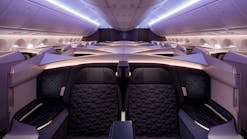Southwest Airlines is putting one of its most valuable assets --- a carefully cultivated offbeat culture --- on the line as it absorbs the operations of AirTran Airways and its Atlanta-centered workforce.
Southwest flight attendants and other employees have long been known for joking around with passengers between safety briefings and snack handouts --- in contrast to the more businesslike approach of many rivals. The strategy began with Southwest's colorful co-founder Herb Kelleher, who once resolved a trademark dispute with an arm wrestling match.
Kelleher's gone, but Dallas-based Southwest still covers the walls of its headquarters with photos of smiling employees, encourages flight crews to clown around, has Halloween parties featuring current CEO Gary Kelly in a ridiculous costume --- and, perhaps most important, hires employees for their personalities.
Now it faces the task of blending more than 8,000 AirTran employees into that culture after the biggest merger in Southwest's history.
"I've been asked many, many times, 'How do you train your people to be so nice?' " Southwest chief marketing officer Dave Ridley told an Atlanta marketing group recently. "You don't train people to be nice. You don't train people to be happy. You hire nice people and you hire happy people."
One Southwest vetting tactic, for instance, is to allow security guards and receptionists to give their opinions on candidates based on their interactions.
"We're looking for people who don't take themselves too seriously," Ridley said.
He recalled a pilot hiring session years ago with 18 applicants in suits and ties. A Southwest executive decided the pilots were too stiff and brought out Hawaiian print shorts for each of them to wear during their interviews in place of their suit pants. Two of the pilots walked out.
"They just had a mentality that they couldn't quite laugh at themselves," Ridley said.
But in acquiring AirTran, Southwest doesn't have that sort of veto power over personalities that might not jibe with its culture.
"There will be some misses along the way," Ridley acknowledged. "My commitment is to try to maintain the culture."
AirTran has "wonderful people," Ridley said. "Are all their people exactly what we would want at Southwest? No." But, he said that's also true of Southwest employees. "We've got some bad apples."
Jackie Freiberg, co-author of a book about Southwest called "Nuts! Southwest Airlines' Crazy Recipe for Business and Personal Success," said Southwest employees are not "dead people walking" --- meaning they're not people who have quit their jobs in their minds but keep coming to work.
The airline hires "people with a spirit that can't be replicated," Freiberg said.
In the case of AirTran workers who might not fit in, she expects Southwest will "do everything in its power to give those people an opportunity to change."
But as a highly unionized airline, the company has limited options.
When it comes to lack of cultural fit, "it's very difficult for an employer to exercise a termination" in a unionized employee group, said Port Washington, N.Y.-based airline consultant Bob Mann.
In merging unionized workforces, Mann said, "you pretty much bring the entire group over, and then train, coach, manage, measure and, if need be, continue that coaching cycle until people are either fed up and leave, or they just stagnate."
Southwest recently held a first wave of training sessions for AirTran flight attendants and customer service employees at a hotel near the Atlanta airport.
When customers are stressed from the hassles of getting through the airport, "use your personality," Southwest training supervisor Bob Carpenter told AirTran airport agents at one session. "If you're nice, how can somebody be mean to you?"
Even baggage handlers should be careful as they handle bags because customers may be looking out the window, he said. And Southwest --- a company big on hugs, parties and cheering --- emphasizes that employees must also treat each other kindly.
The AirTran employees got plastic wristbands bearing the words "Embrace It! Recognize It! Live It!"
"I feel the culture," AirTran customer service employee Robert Wingard said afterward.
But Southwest's culture isn't always about smiles and giggles, and the company has already encountered a delay in the integration of the two airlines. A conflict has arisen between Southwest and AirTran pilots, particularly because some AirTran pilots want to go to arbitration to decide how the two airlines' pilot seniority lists will be combined.
Southwest management values "one asset above all others --- their culture," AirTran pilots union leader Linden Hillman noted in a memo to members.
Southwest executives "have figured out that their culture is one of the key ingredients, if not THE key ingredient, in their success," the memo said, and they believe going to arbitration for a pilot seniority integration deal "will threaten the culture they intend to defend."
Mann explained that in arbitration, "you lose control over the outcome." He said Southwest's preferred approach to conflicts in most cases seems to be --- as evidenced by Kelleher's long-ago arm-wrestling settlement --- " 'Let's try to get this done consensually and have some fun with it,' as opposed to 'Let's go to the mat, get all dirty, and end up with hard feelings over the outcome.'
"I think that's part of their culture," Mann said. "The rest of the industry lives on litigation."
Among employees in some airline mergers, two factions remain even years after the deal closes --- a phenomenon Southwest wants to avoid.
"You can make procedures standard very quickly," Mann said. "But culture is another thing entirely."





